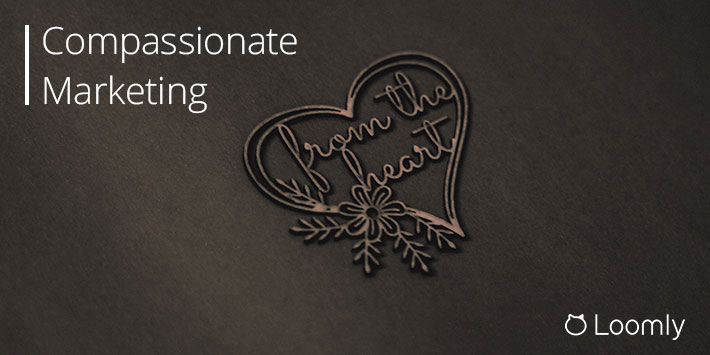Compassionate Marketing: Why Your Brand Should Embrace Benevolence
Compassionate marketing is not about looking nice on the surface just because it’s the expected norm. Neither is it about being opportunistic nor jumping on the bandwagon in times of crisis.
It involves embracing benevolence from the ground up, and genuinely looking after and caring for your customers and employees, at all times, not only in times of turmoil.
So how do you go about implementing compassionate marketing?
That’s what this guide is all about. We’ll take a look at some examples of successful campaigns and then show you how your brand can implement compassionate marketing, too.

Manage all your social media accounts in one place.
Craft, schedule, & auto-post content to all your social channels, then track analytics and manage interactions from a single, easy-to-use dashboard.
What is Compassionate Marketing?
Compassionate marketing is all about being real and authentic.
It means your brand has to show its human side through empathy, benevolence, and a genuine connection with your customers.
If you’re not genuine, people will see through you. As Dave Loomis says:
”If you really mean it, say it. If you don’t mean it or it feels cliche, leave it out.”
Compassion vs Empathy
There’s a subtle difference between compassion and empathy:
- Compassion refers to both an understanding of another’s pain and the desire to somehow mitigate that pain.
- Empathy refers to the ability to relate to another person’s pain vicariously, as if one has experienced that pain themselves.
Why Compassionate Marketing is the Only Way to Go
Taking care of your customers is always a smart business practice, and it’s the only way to go in 2021 and beyond, regardless of the coronavirus pandemic.
Nowadays, it’s more important than ever to empathize, not just sympathize. Brands need to be extra sensitive to how customers might be feeling and how they put their message across to them.
Instead of being manipulative or pressuring consumers into buying something, brands need to step back and help customers make the right decision, and that might mean not buying their product or service right now.
Now more than ever, brands need to show their human side by sharing positive, responsible, and compassionate marketing as an empathetic approach will result in brand credibility and customer loyalty.
Examples of Successful Compassionate Marketing Campaigns
Here are four examples of compassionate marketing campaigns from leading brands.
Aveeno
At the start of the pandemic, health and well-being brand, Aveeno, asked their Instagram community for suggestions on what they wanted to hear from the brand.
“What you think matters, so we’d love to hear from you about the content you’d like to see.”
Rather than pumping out their ideas, they took an empathetic approach to find what their followers wanted.
National Autistic Society
While most people have heard of autism, not many understand it in a meaningful way. To educate people, the National Autistic Society created a VR video to put viewers in the shoes of a 12-year-old autistic boy.
Experiencing the sensory overload of navigating a shopping mall with flickering lights and booming sounds allowed people to be more empathetic, rather than sympathetic, toward the charity.
Dove
Here are a couple of examples from Dove showing how it is a compassionate and empathetic brand.
During the pandemic, Dove encouraged people to stay at home with a compassionate, user-generated content campaign.
On Instagram, they asked followers to share the reasons why they stay at home:
“Share your own #IStayHomeFor photo, and tag six of your friends asking them to do the same
And don’t forget to tag @dove so we can share them
”
In 2013, its ‘Real Beauty’ campaign tapped into the idea that most of us struggle with low self-esteem – just 4% of women consider themselves beautiful.
The video showed a woman describing her facial features to a sketch artist before being presented with two results – one image based on how she described herself, and the other on how someone else sees her.
As you can imagine, the video – with its tagline “you are more beautiful than you think” – caused an emotional response. But surprisingly, there was no mention of Dove products anywhere in the video – it focused solely on encouraging women to have more self-belief.
How to Implement Compassionate Marketing for Your Brand
Here are 12 ways your brand can implement compassionate marketing.
1. Ensure your core values remain relevant
As things are always changing, it’s essential to reassess your core values and ensure they are still relevant. Consider what’s important to your brand and what’s important to your customers. During uncertain times, like the pandemic, you’ll need to be more sensitive to the changing circumstances.
2. Ask and respond to questions
Compassionate marketing requires you to listen to those around you so that you can help them. If you ask your community how you can help, make sure you listen to what they say and take action.
In the example of Aveeno above, customers said they wanted to hear more about the products and how to use them:
“More info on each product and tips on how when or what specifically to use it with :)”
They also said they’d welcome content about self-care and positivity:
“Self-care and positivity are good.”
Aveeno listened, and in the following posts, they shared more about their products and how they could be used for specific conditions like eczema.
They also launched a #HealingHands campaign to thank nurses for their help.
3. Showing compassion in your community
Compassionate marketing is intentional and purpose-driven. Doing good and showing compassion means making decisions that are less about you and more about serving the greater community.
Burger King UK showed their compassion by making a generous offer to independent restaurants across the country forced to close during the coronavirus lockdown:
“Until they can reopen, they can advertise on our Instagram page for free.”
They invited friends from the hospitality sector to share their signature dish on Instagram with the hashtag #WhopperAndFriends.
And true to their word, they started featuring them with captions like:
“There’s more to life than the Whopper, there’s also @black_bull_moulton
Check out their account and show them your support!
#WhopperAndFriends”

4. Listen to your heart
Compassionate marketing requires you to step back and listen to your heart. It’s all too easy to get blinkered with cold, matter-of-fact, business-only decisions, when we should be opening our eyes and ears to what’s happening around us. That might mean your brand delays a product launch or reschedules a campaign to fit in with the current climate.
5. Promote health and well-being
Health and well-being have always been important to consumers, and the pandemic pushed it to the forefront of everyone’s mind. It’s essential that your marketing acknowledges this factor and demonstrates that you’re looking out for your customers and employees.
For instance, if you operate a physical retail store, you can outline the processes you have in place to keep fixtures, fittings, and flooring clean and safe to reassure customers and employees you’re looking after them.
6. Provide extra services for vulnerable customers
On a similar note, you could market additional services for vulnerable consumers. For example, during the pandemic, ALDI created an exclusive shopping window for senior citizens, expectant mothers, and individuals with health concerns.
“On Tuesdays and Thursdays, ALDI stores will open at 8:30 a.m. and reserve the first hour of business for vulnerable shoppers.”
7. Sense-check your content before publishing
If you plan and schedule your content ahead of time, it’s a good idea to have a “sense check” before it’s published. What seemed like a good idea a few weeks back, might not be wise now. Things change quickly, and if you’re not careful, you can come across as an insensitive brand if you just plow on regardless. Make sure your content is empathetic to the current climate before publishing it.
8. Provide value now (and leave sales till later)
Compassionate marketing entails providing value now and gaining sales later. During uncertain times when the economy is shaky and people are frightened of losing their jobs, they don’t need a heavy sales pitch. They need compassion.
If your brand is in a strong position, you can offer something free now to help those in need. People will remember those empathetic brands willing to give away their content/product/service during times of uncertainty.
For example, Loom gave free access to their premium video platform, Loom Pro, so teachers and students could have online classes during the lockdown:
It’s time to take action.
In response to the #coronavirus, we’re cutting prices, removing limits, and making Loom free for teachers & students.
Here’s a short message from our Co-founder & CEO, @yoyo_thomas (more here: https://t.co/wcBXIXEdI0): pic.twitter.com/4OAs7atp8g
— Loom (@loom) March 12, 2020
“One more thing: Loom Pro is now free for education. FOREVER. Teachers and students using Loom for classroom work get Loom Pro for $0/mo, for good.”
While knitting brand Wool And The Gang offered free daily stitch tutorials to help consumers remain calm and focused:
“At 5pm GMT every day, we will link to a different stitch tutorial on YouTube. We will also add the tutorials to our NEW story highlights so you can access them whenever you need. Let’s take this time to learn something new, celebrate the power of making, and keep in touch with our local knitworks.”
9. Promote safe spending
On a related note, you can encourage customers to spend more conservatively. Instead of focusing your marketing campaigns on quantity, like “Buy One, Get One Free”, focus on quality.
Also, if you’re offering payment plans and interest-free options, be that brand that advises consumers on the dangers of entering a credit agreement that may be beyond their means. It’s better for them to save the money and make the purchase later when they know they have the funds upfront.
10. Show concern and care toward customers
Many motor brands, such as Ford and Hyundai, offered payment holidays for those customers who were on reduced pay or had lost their job during the pandemic:
“We want to help make things better and help you focus on what matters most. So in response to recent world events, we’re deferring payments on select new Hyundai models for 90 days. And with Hyundai Assurance, we will cover your payments for up to 6 months should you lose your job this year due to COVID-19.”
11. Show spontaneous compassion
You don’t always have to plan compassionate marketing campaigns and communications. Sometimes, leaving a spontaneous reply to a social media comment can make a lasting impression on an individual. Plus, taking the time to listen to an employee who needs help and support can demonstrate that you are part of a caring and compassionate brand.
12. Support customers throughout the journey
Getting a sale is great, but providing a fast, effective, and courteous service shows your customers you care about them and lifts your brand above competitors. People rely on personal recommendations from friends and family more than advertising. So providing top-class support before, during, and after a purchase can position your brand at the top of a crowded market.
Compassionate Marketing in a Nutshell
Taking care of your customers, employees, and community is a smart business practice.
Challenging and uncertain times shine a light on those brands that care — the brands that say what they mean, and mean what they say. People will remember those brands, and forget the others.
Your brand can demonstrate compassionate marketing at any time by:
- Ensuring your core values remain relevant
- Asking and responding to questions
- Showing compassion in your community
- Listening to your heart
- Promoting health and well-being
- Providing extra services for vulnerable customers
- Sense-checking your content before publishing
- Providing value now (and leaving sales till later)
- Promoting safe spending
- Showing concern and care toward customers
- Showing spontaneous compassion
- Supporting customers throughout their journey
The brands that practice compassionate marketing are the ones that people trust most — and the ones that can survive any crisis.



